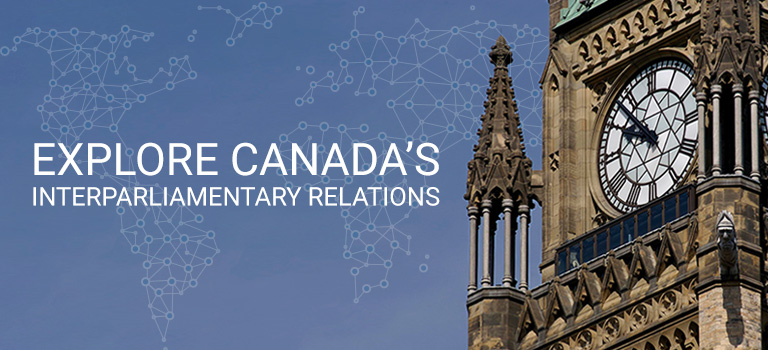Interparliamentary Activities and Reports
Refine your search
Results: 601 - 610 of 1002
April 9 - 10, 2022
Executive Committee Meeting (EXCO)
By videoconference
Canadian Branch of the Commonwealth Parliamentary Association (CCOM)
The Canadian Branch was represented by the Mr. Terry Duguid, M.P.
April 5, 2022
Meeting between Her Excellency Melita Gabric, Ambassador of the European Union to Canada and Mr. Francesco Sorbara, MP, President of the Canada-Europe Parliamentary Association
Ottawa, Ontario, Canada
Canada-Europe Parliamentary Association (CAEU)
In their first meeting since the election of Mr. Sorbara as CAEU President, the Ambassador and Mr. Sorbara discussed Russia’s aggression against Ukraine and the impact on the European Union (EU)’s energy security. Mr. Sorbara voiced his understanding of the situation and highlighted the role that Canada can play in helping to meet the EU’s energy needs.
They also discussed the Canada–European Union Comprehensive Economic and Trade Agreement and its importance in light of current events and its upcoming five-year implementation anniversary.
Finally, they discussed opportunities for further collaboration, including ways in which CAEU could highlight Europe Day on 9 May 2022.
March 30, 2022
OSCE Parliamentary Assembly and ODIHR Joint Event on "Realizing Gender Equality in Parliaments: Transforming Institutions, Delivering for all Women and Men"
By videoconference
Canadian Delegation to the Organization for Security and Co-operation in Europe Parliamentary Assembly (SECO)
March 29, 2022
Meeting of the Executive Committee of the ParlAmericas Parliamentary Network on Climate Change
By videoconference
Canadian Section of ParlAmericas (CPAM)
March 28, 2022
Meeting with the Council of the European Union Working Party on Transatlantic Relations (COTRA)
Ottawa, Ontario, Canada
Canada-Europe Parliamentary Association
The CAEU members were Mr. Francesco Sorbara, M.P., President; Hon. David Wells, Senator, Vice President; Hon. Julie Miville-Dechêne, Senator; Hon. Lucie Moncion, Senator; Hon. Lena Metlege Diab, M.P.; Salma Zahid, M.P.; and Stéphane Bergeron, M.P.
The COTRA delegation was headed by Mr. Tomás Reyes Ortega, Chair, and included 11 diplomats from EU member states, and two representatives from the General Secretariat of the Council of the EU and the EU’s European External Action Service. COTRA’s work focuses on EU relations with the United States and Canada and covers a broad range of issues, from cyber, energy and security policy to economics and trade.
Her Excellency, Melita Gabric, Ambassador of the European Union to Canada, chaired the meeting and was accompanied by Ms. Eva Palatova, Head of Political and Public Affairs at the Delegation of the EU to Canada.
The main topics of discussion were Russia’s aggression against Ukraine and the impact on the EU’s energy security as well as food security. They also discussed increasing Russian disinformation and misinformation and potential mitigation solutions, especially considering Russia’s attack on Ukraine. Participants also highlighted collaborative defence and security initiatives between the EU and Canada.
Finally, they discussed the Canada–European Union Comprehensive Economic and Trade Agreement and the importance of the ratification process that is now taking place in each EU member state.
March 23, 2022
Online meeting on "The role of the OSCE in addressing the conflict in Ukraine and its consequences"
By videoconference
Canadian Delegation to the Organization for Security and Co-operation in Europe Parliamentary Assembly (SECO)
March 22, 2022
6th Gathering of ParlAmericas Open Parliament Network (plenary session)
By videoconference
Canadian Section of ParlAmericas (CPAM)
Results: 601 - 610 of 1002 — Page: 61 of 101


